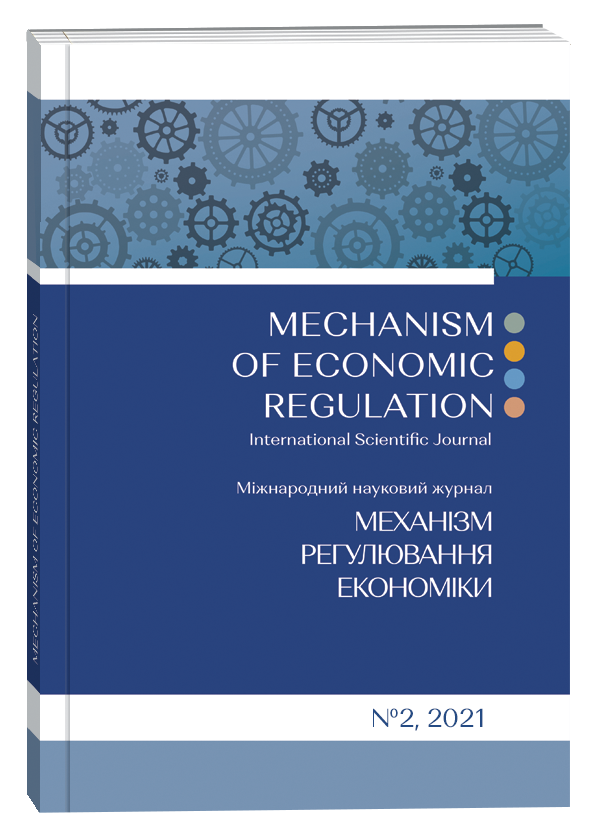RENEWABLE ENERGY GENERATION IN THE ENERGY BALANCE: THE FORECAST UNTIL 2035
Abstract
This paper summarizes the arguments and counterarguments within the scientific discussion on developing national economic energy efficiency under optimizing renewable energy generations. This study aims to forecast renewable energy generation until 2035 under the current Ukrainian conditions. The relevance of this scientific issue is the urgency to combat the climate change consequences under economic development. A bibliometric analysis was conducted in the study frameworks to systemize the scientific treatises and indicate main research directions in energy investigation. The source of publications was the Scopus database. The VOSviewer software tools were applied to visualize the obtained results. In turn, to gain the research goal, the authors forecasted the primary energy generations from renewable sources using Autoregressive Integrated Moving Average (ARIMA) model. The study sample was the shares of primary energy from renewable sources in Ukraine. The data covers 19852019. The results of bibliometric analysis allowed identifying main directions in investigating the energy policy such as renewable energy development under climate change; bioenergy; reducing carbon emissions towards economic growth; energy security and policy; management in the energy sector; satisfaction of the energy demand and improving the energy conditions for consumers. In the empirical part of this study, the forecast findings showed the growing tendency in primary energy generation from renewable sources. However, the share of primary energy from renewable sources would increase by 1.16 times (3,62 %). Therefore, the authors concluded that the target of the Energy Strategy of Ukraine of 25 % the share of primary energy from renewable sources would not be gained until 2035. This study highlights the necessity to develop renewable energy in Ukraine. The obtained results could be the base for further investigations devoted to elaborating the energy policy towards developing energy efficiency and green development.
References
Chygryn, O. (2012). Problems of assessing the enterprise investment attractiveness. Proceedings of All-Ukrainian scientific-practical conference (with international participation "Investment and innovation strategy of enterprise development", Zhytomyr, 55–56.
Chygryn, O. & Pimonenko, T. (2011). Ecological and economic aspects of introduction of modern instruments of ecopolitics in the corporate sector. Proceedings of the University of the State Fiscal Service of Ukraine, (1), 602–614.
Chygryn, O., Krasniak, V. (2015). Theoretical and applied aspects of the development of environmental investment in Ukraine. Marketing and Managements of Innovations, 3, 226–234.
Energy Strategy of Ukraine until 2035 (2021). White Book of Ukrainian Energy Policy "Security And Competitiveness". Retrieved from: https://ips.ligazakon.net/document/NT1202.
Hakimova, Y., Samusevych, Y., Alijanova, S., & Guluzade, E. (2021). Eco-Innovation VS. Environmental Taxation: What is More Effective for State Budget? Marketing and Management of Innovations, 1, 312–323. https://doi.org/10.21272/mmi.2021.1-24.
Kolosok, S., Pimonenko, T., Yevdokymova, A., Nazim, O. H., Palienko, M., & Prasol, L. (2020). Energy efficiency policy: impact of green innovations. Marketing and Management of Innovations, 4, 50–60. https://doi.org/10.21272/mmi.2020.4-04.
Krukov, Yu., and Chernyagin, D. (2011). An Arima model for forecasting a values of network traffic. Journal of Information Technologies and Computing Systems, 2, 41–49.
Lyulyov, O., Pimonenko, T., Kwilinski, A., Dzwigol, H., Dzwigol-Barosz, M., Pavlyk, V., & Barosz, P. (2021). The Impact of the Government Policy on the Energy Efficient Gap: The Evidence from Ukraine. Energies, 14(2), 373.
Lyulyov, O., Pimonenko, T., Stoyanets, N., & Letunovska, N. (2019). Sustainable development of agricultural sector: Democratic profile impact among developing countries. Res. World Econ, 10, 97–105.
OECD.Stat (2021). Green Growth Indicators. Retrieved from: https://stats.oecd.org/Index.aspx?DataSetCode=GREEN_GROWTH.
Ordinance of the Cabinet of Ministers № 605-p dated on August 18, 2017 On approval of the Energy Strategy of Ukraine until 2035 "Security, energy efficiency, competitiveness". Retrieved from: https://zakon.rada.gov.ua/laws/show/605-2017-%D1%80#Text.
Our word in Data (2021). Renewable energy. Retrieved from : https://ourworldindata.org/renewableenergy.
Palienko, M., Lyulyov, O., & Denysenko, P. (2017). Fiscal Decentralisation as a Factor of Macroeconomic Stability of the Country. Financial markets, institutions and risks, (1, Is. 4), 74–86.
Panchenko, V., Harust, Yu., Us, Ya., Korobets, O., & Pavlyk, V. (2020). Energy-Efficient Innovations: Marketing, Management and Law Supporting. Marketing and Management of Innovations, 1, 256–264. https://doi.org/10.21272/mmi.2020.1-21.
Pimonenko T., Us J., Leus D., Fedyna S. (2017). The modern ecological and economic instruments for sustainable development. Visnyk of Sumy State University. Economy series, 2, 57–67.
Pimonenko, T, Lyulyov, O., Us, Ya. (2016). Feed-in tariff like an incentive instrument to enlarge renewable energy using by households. Proceedings of XXII International Scientific Conference "Economics for Ecology" ISCS'2016, 78–81.
Pimonenko, T., Liuliov, O., & Us, Y. (2019). Marketing strategies of green investments: basic concepts and specific features. Herald of Ternopil national economic university, (1 (91)), 177–185.
Pimonenko, T., Lyulyov, O., & Chygryn, O. (2018). Marketing of green investment: collaboration between main stakeholders. Reporter of the Priazovskyi State Technical University. Section: Economic sciences, 1(36), 214–220.
Pimonenko, T., Lyulyov, O., Us, Ya. (2018). Green Development of Small and Medium Enterprises of Ukraine: the EU Experience. Proceedings of the International Scientific Conference "Competitiveness and Innovation in the Knowledge Economy", 2, 28–29 Septembrer 2018, Kishinev, Moldova, p.69–78.
The World Bank. (2021). Retrieved from: https://data.worldbank.org/indicator/NY.GDP.PCAP.KD?locations=UA.
Us, Y., Pimonenko, T., & Lyulyov, O. (2021). Energy efficiency profiles in developing the freecarbon economy: On the example of ukraine and the V4 countries. Polityka Energetyczna, 23(4), 49– 66. https://doi.org/10.33223/epj/127397.
Ziabina, Y., & Pimonenko, T. (2020). The Green Deal Policy for Renewable Energy: A Bibliometric Analysis. Virtual Economics, 3(4), 147–168.
Ziabina, Y., Lyulyov, O., Pimonenko, T. (2019). Development of green energy as a way to energy independence of the national economy: experience of EU countries. SCIentific bulletin of Polissia, 3 (19), 39–48.
Ziabina, Ye. (2016). Theoretical Aspects of the Formation of Green Economy in the Context of Sustainable Development. Mechanism of Economic Regulation, 3, 116–121.


